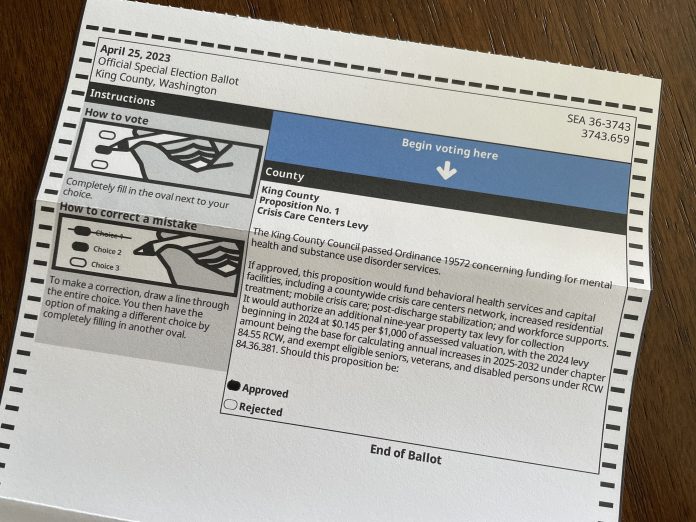This month, King County voters have the chance to significantly expand our county’s capacity to support people experiencing mental health crises by passing the behavioral health levy on the April Special Election ballot. They should take the opportunity by voting yes for these desperately needed services, then keep the cap off their pens to write to their County Councilmember and tell them to stop putting so many basic services to the voters through penny-ante special elections every few months, and instead fund significantly expanded behavioral health services permanently.
There’s no question the levy must be passed. Our system is reeling from a grueling pandemic, which brought both sickness and social isolation. The number of people experiencing mental health crises increased right as our healthcare system was most taxed. We must invest.
To overcome these hurdles, the levy will develop five new walk-in, 24/7 behavioral health crisis centers. Four will be located in the county’s various regions, and a fifth will focus on care of young people under age 19. The levy will add $0.145 per $1000 to a property’s tax bill, or $111.50 to the average King County home value of $769,000. The levy would raise $1.25 billion over its nine-year lifespan.
This is a small price to pay for a desperately needed increase in capacity. The current system has very few mental health beds, and most are only available through a referral by police or first responders. Requiring people to experience a level of distress that requires emergency response just to get help is not just incredibly expensive, it is inhumane. And the numbers reinforce how much services are needed:
- Call volume to King County’s regional behavioral health crisis line increased by 25% between 2019 and 2021, from 82,523 calls in 2019 to 102,754 calls in 2021.
- The number of persons per year who received community-based behavioral health crisis response services in King County increased 146% between 2012 and 2021, from 1,764 persons served in 2012 to 4,336 persons served in 2021.
- Referrals for mobile crisis outreach in King County grew 15% between 2019 and 2021, from 4,030 referrals in 2019 to 4,648 referrals in 2021.
- King County’s designated crisis responders conducted 14% more investigations for involuntary behavioral health treatment in 2021, when they investigated 9,189 cases, than in 2017 when they investigated 8,066 cases. There was a 10% increase in detentions or revocations for involuntary hospitalization during that same period, from 4,387 in 2017 to 4,806 in 2021.
- The wait time for a King County resident in a behavioral health crisis in a community setting to be evaluated for involuntary behavioral health treatment tripled between January 2019 and June 2022, from 4 days to 12 days.
Crisis care centers promise to address these needs by allowing people to seek mental health care voluntarily, without the need for stigma causing involuntary admission. The side-benefits cannot be understated. People who are uninsured or experiencing homelessness will have the opportunity to access much needed care. Teens and young adults will have a dedicated facility for mental health, available before entering the cycle of hospitalization or incarceration.
But the April vote requires two caveats. First, there is no reason crisis care should be funded by a levy. Maintaining a healthy population is a foundational job of local government, and mental and behavioral health are fundamental parts of that, full stop. The need to append crisis care on to an underfunded healthcare system is an insult to every King County resident.
Second, we should not be having another election this spring. In Seattle’s case, voters this year are being asked to weigh in on a social housing levy (I-135) in February, the crisis center levy in April, the August primary, and the November general election. That’s four separate elections in an odd year.
Our ideal voting system would move local elections to even years to boost turnout rather than cramming four different elections in odd years when turnout historically has been much lower. The Washington State Legislature will need to remove its prohibition and give the go ahead for municipalities to move their elections to even years, but in the meantime lightening the load in odd years would be a start.
Together, these two issues would be solved by lifting Tim Eyman’s 1% property tax increase cap and implementing a progressive income tax. Stop the need for every miniscule cost to come in front of voters dependent on the whims of home prices. Basic health care is a human right, not a covenant that runs with property. We should be funding it and all municipal, county, and state services appropriately without the need to run levy for basic services.
Until we live in that world however, definitely vote yes on the crisis center levy to boost funding for mental health. It’s not nearly enough, and it’s desperately needed.
The Urbanist Editorial Board includes Natalie Argerious, Ray Dubicki, Stephen Fesler, Ryan Packer, and Doug Trumm.


